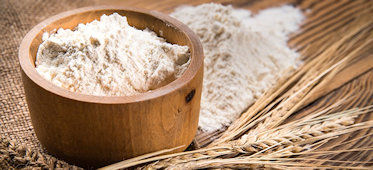|
Help Lower Weight and Cholesterol
Rye flour can positively affect you metabolically speaking. Rye positively differs from wheat when digested, and it’s been shown to actually suppress body weight gain, as well as significantly lower obesity. Whole grain rye has been shown to improve insulin sensitivity and lower total plasma cholesterol.
This makes rye a cholesterol-lowering food and effective weight management flour.
Glucose Control
Rye flour and rye bread can also help regulate and improve the blood glucose profile. When scientists from Sweden studied the effects of rye in patients tested during breakfast meals, they found that whole grain rye products, bran rye breads and endosperm rye flours, especially sourdough rye breads, were excellent at improving glycemic profiles, stabilizing insulin responses and improving sensitivity to insulin.
This shows that rye flour can help manage and lower the risk for diabetes.
Appetite Control
Not only can rye flour help you to eat less during a meal, but it helps you feel satisfied for hours after you finish your meal. In one study, it was shown that patients who received the same amount of caloric intake from their breakfasts but were given rye porridge instead of wheat or another grain had a satisfied feeling without needing to intake more food for up to eight hours after their meals.
A similar study was conducted but used rye bread instead of rye porridge. Researchers found that having rye bread at at meal led to less appetite before and after the following meal, showcasing rye’s powerful ability to help achieve satiety.
Inflammation
When patients with metabolic syndrome were put on a 12-week diet of rye and pasta, it was shown that the insulin responses after meals were better and helped reduce inflammation in the body as a result compared to a 12-week diet of oats, wheat bread and potatoes.
This reduction in inflammation in metabolic syndrome patients can be beneficial in reducing the chances of diabetes as well.
Gene Regulation
It’s recently been shown that while everyone has certain genes in the body that make that person more susceptible to various conditions, diet and lifestyle can help train these genes to be “down-regulated.” Studies have shown by replacing an oat-wheat-potato diet with rye products can actually help down-regulate genes that can lead to diabetes and other serious health issues.
In fact, research has shown that patients on a predominantly oat-wheat-potato diet have actually up-regulated genes associated with negative health outcomes, making rye a much better option.
Gallstones
The insoluble fibre that is so high in rye breads and rye flour products can help reduce the risk of gallstones. The fibre in rye flour helps speed up elimination time in the intestine as well as reduce the amount of bile acids in the stomach that lead to gallstones.
That’s why high-fibre foods like rye are so beneficial to your digestion and waste elimination.
Fights Cancer
Whole grain rye flour has many potent cancer-fighting properties. These include high amounts of soluble and insoluble fiber, polyphenols, saponins, phytic acid, resistant starch and protease inhibitors, which help prevent cancer cells from spreading.
In fact, these same phytonutrients that help fight and prevent cancer also have shown the ability decrease the risk of heart disease and reduce the negative symptoms of menopause.
|

